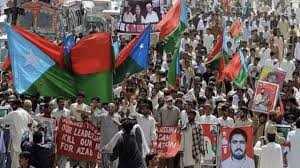
The Baloch freedom movement has gained renewed international attention following a declaration of independence in May 2025. Leaders of the Baloch nationalist movement formally announced the establishment of the Republic of Balochistan, calling it a turning point in their decades-long struggle against what they describe as political marginalization, economic exploitation, and human rights violations under successive governments of Pakistan.
Historically, the roots of the Baloch movement trace back to 1947 when the princely state of Kalat—comprising much of modern-day Balochistan—initially declared independence following the partition of British India. However, the region was integrated into Pakistan in 1948, a move that many Baloch leaders and historians consider forced and illegitimate.
Since then, Balochistan has witnessed at least five major uprisings against the federal government, with the current phase of insurgency ongoing since 2003. These have been marked by armed resistance, as well as political mobilization, with organisations like the Baloch Students Organization (BSO), Baloch Liberation Army (BLA), and Balochistan Liberation Front (BLF) playing significant roles.
Critics of Pakistan’s policies in the region point to widespread reports of enforced disappearances, extrajudicial killings, and lack of development despite the region’s rich natural resources. The China-Pakistan Economic Corridor (CPEC), a key part of China’s Belt and Road Initiative, has further inflamed tensions, with many local residents and leaders viewing it as an example of external control over local assets.
On May 14, 2025, Baloch leaders issued a declaration seeking international recognition of Balochistan as an independent state and called for UN peacekeeping forces to protect civilians. The move has sparked debate in regional and international circles, with diaspora communities and human rights groups echoing demands for greater accountability and transparency in Pakistan’s Balochistan policy.
The leadership also signed symbolic proposals, such as renaming Pakistan’s Jinnah House as "Balochistan House," underscoring their rejection of Pakistani sovereignty over the region. Observers say the latest developments may redefine South Asia’s geopolitical landscape, depending on the international community’s response.
International human rights groups, including Amnesty International and Human Rights Watch, have consistently raised concerns about violations in Balochistan. The ongoing humanitarian and political crisis continues to affect thousands of families in the region, many of whom still await information about missing loved ones.
While the situation remains fluid, Baloch leaders assert that their goal is peaceful recognition, greater regional cooperation, and long-term stability. Whether these aspirations will translate into international support remains to be seen.
Email:-------------------vadaiekashmir@gmail.com
The Baloch freedom movement has gained renewed international attention following a declaration of independence in May 2025. Leaders of the Baloch nationalist movement formally announced the establishment of the Republic of Balochistan, calling it a turning point in their decades-long struggle against what they describe as political marginalization, economic exploitation, and human rights violations under successive governments of Pakistan.
Historically, the roots of the Baloch movement trace back to 1947 when the princely state of Kalat—comprising much of modern-day Balochistan—initially declared independence following the partition of British India. However, the region was integrated into Pakistan in 1948, a move that many Baloch leaders and historians consider forced and illegitimate.
Since then, Balochistan has witnessed at least five major uprisings against the federal government, with the current phase of insurgency ongoing since 2003. These have been marked by armed resistance, as well as political mobilization, with organisations like the Baloch Students Organization (BSO), Baloch Liberation Army (BLA), and Balochistan Liberation Front (BLF) playing significant roles.
Critics of Pakistan’s policies in the region point to widespread reports of enforced disappearances, extrajudicial killings, and lack of development despite the region’s rich natural resources. The China-Pakistan Economic Corridor (CPEC), a key part of China’s Belt and Road Initiative, has further inflamed tensions, with many local residents and leaders viewing it as an example of external control over local assets.
On May 14, 2025, Baloch leaders issued a declaration seeking international recognition of Balochistan as an independent state and called for UN peacekeeping forces to protect civilians. The move has sparked debate in regional and international circles, with diaspora communities and human rights groups echoing demands for greater accountability and transparency in Pakistan’s Balochistan policy.
The leadership also signed symbolic proposals, such as renaming Pakistan’s Jinnah House as "Balochistan House," underscoring their rejection of Pakistani sovereignty over the region. Observers say the latest developments may redefine South Asia’s geopolitical landscape, depending on the international community’s response.
International human rights groups, including Amnesty International and Human Rights Watch, have consistently raised concerns about violations in Balochistan. The ongoing humanitarian and political crisis continues to affect thousands of families in the region, many of whom still await information about missing loved ones.
While the situation remains fluid, Baloch leaders assert that their goal is peaceful recognition, greater regional cooperation, and long-term stability. Whether these aspirations will translate into international support remains to be seen.
Email:-------------------vadaiekashmir@gmail.com
© Copyright 2023 brighterkashmir.com All Rights Reserved. Quantum Technologies